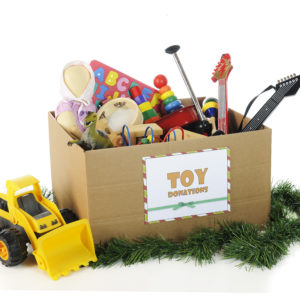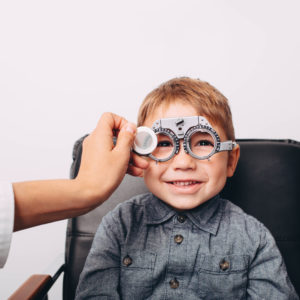Encouraging Developing Eyes
Beyond being an optometry student, you may be a parent, an aunt or uncle, a cousin, or a special friend to children whose visual needs are developing. By learning about toy safety, choosing to play with toys that help vision development, and spreading the word about InfantSee, you can be a positive influence to the children in your life.
Toy Safety
Between holidays, birthdays, and other special occasions, there are many opportunities to go toy shopping for the children in your life. We want to make sure that the children you are buying gifts for are safe. To help reduce the chances of a sending a child to the emergency room because of a toy accident, follow these few simple safety tips:

- Check and abide with the age labels for toys.
- Avoid sharp, protruding, or projectile parts in toys
- Include safety gear and eyewear with any sports equipment.
- Avoid toys with lasers.
For more information on how to protect children’s vision check out PreventBlindness and the AOA.
Visual Development Toys
Do you feel like the toys you are buying get played with a few times, but then are easily forgotten? Consider buying some toys that help promote development of the visual system and the brain. We promise you will be the new favorite gift-giver in the family!
Some great options are:
- Building toys – building blocks, Lego bricks
- Fine motor toys – LightBrite, Play-Doh
- Space perception toys – Beanbag toss, Jenga
- Visual thinking toys – Tangoes, Rush hour
- Memory games – Simon, Memory
- Balance and Coordination – Twister, Hoola hoop, Skip-It
For more great gift ideas check out the AOA’s list of toys and games for vision development.
InfantSee Eye Exams
Make sure that the parents of the young children in your life take full advantage of the InfantSee program. This program was developed to provide a no cost comprehensive infant eye and vision assessment by participating optometrists. Check out InfantSee to see what they can do for you and where you can find a participating optometrist.
Did you know that:

- 1/5 preschoolers have vision problems, and by the time that they enter school, 25% of them will need to wear corrective lenses
- School screenings, which are a good start, do not replace regular eye exams as they miss up to 75% of vision problems
- Infants should have a comprehensive eye exam between the ages of 6 and 12 months of age as this is the most critical period of vision development
- Early examinations can help reduce the chance of your child developing vision problems later in the future
No matter what your role is in the lives of the children you know, you can help protect their eyes, stimulate vision development, and support infant eye exams to help them get the best start with their eyes. After all, their futures are bright!

